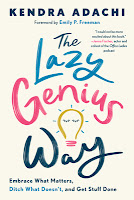My Rating: 3.5 stars
I definitely have mixed feelings when it comes to my thoughts on this book. Admittedly, I don’t read a lot of non-fiction books, especially ones that fall into the “self-help” category (as this one undoubtedly does). One reason is because I don’t find most of these “self-help” books particularly “helpful” and since it takes me longer to read non-fiction books in general, I feel it wouldn’t be a good use of my time. In this light, Cal Newport’s latest book, Slow Productivity, is a bit of an anomaly – on the one hand, I found the anecdotes and stories it tells of a wide-ranging mix of famous people such as Isaac Newton, Jane Austen, Benjamin Franklin, Georgia O’Keefe, Jewel, Alanis Morrisette, etc. quite fascinating and entertaining. While some of the examples that Newport used to illustrate his points were a bit of a stretch in my opinion, the interesting storytelling made up for the shortcomings in this area, in my opinion. With that said however, as a practical guide on productivity, I don’t feel this book was tremendously helpful. Case in point – despite having just finished the book, I’ve already forgotten the “principles” that form the basis of the “slow productivity” philosophy that Newport advocates as well as the practical strategies that he suggests for combatting burnout. Even after re-reading the summary in attempts to trigger my memory, what comes to mind first and foremost are the stories and anecdotes rather than the guidance or any actionable advice that Newport provides.
Given the above, it should probably come as no surprise that I don’t have a whole lot to say about this book, so my review will be shorter than what I usually write. I do recall thinking to myself at various points that I might be able to apply a particular concept in my life, but then I would get to one of the stories and would become so absorbed that I forget the previous point. Overall, I did get some things out of this book, so it definitely wasn’t a wasted effort in terms of reading experience, just maybe it didn’t serve the purpose that the author intended for it to serve.










